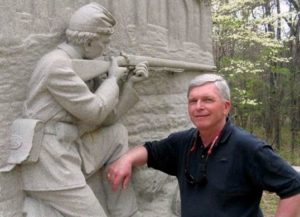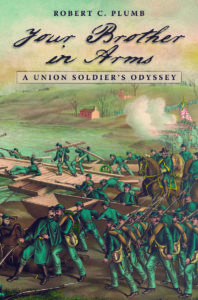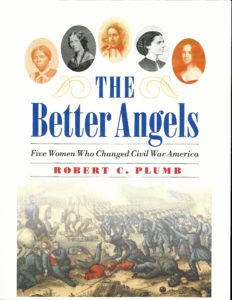
Bob Plumb didn’t grow up dreaming of becoming a famous Civil War author. A versatile writer whose works include Your Brother in Arms: A Union Soldier’s Odyssey and The Better Angels: Five Women Who Changed Civil War America, Plumb was born and raised in upstate New York, and his geographic borders shaped him in many ways. In fact, it was the Revolutionary War that captured his imagination as a child. But writing was always in his blood, and many years later when a relative introduced him to the letters of George McClelland, he found his muse. The rest, pardon the pun, is history.
Plumb’s wife’s uncle was Preston Ewing, the well-known artist and Civil War buff. He also turned out to be Plumb’s conduit to McClelland. “He had a collection of forty-two letters written by this Union infantry soldier from Pennsylvania who served in the Army of the Potomac from 1862 to 1865,” recalls Plumb. “I literally spread them out across our dining room table, looked at my wife, and said, ‘This is a book!’”
Indeed, the letters proved to be a perfect backdrop to McClelland’s incredible story. Four years later, in April 2011, Your Brother in Arms was released. Writing a 336-page tome on a Union soldier was a learning experience for Plumb, especially after a long and distinguished career as a marketing executive. “It took a tremendous amount of work,” he says. “I walked every battlefield that McClelland walked.”
As Plumb discovered, the book was a natural extension of his childhood. As a kid, he was drawn to the military and writing. His father was an Army soldier who served in the South Pacific in World War II. That left Plumb’s early upbringing to his mother and maternal grandparents. They taught him a love of the outdoors and history. A trip with his family to Fort Ticonderoga opened his world to the American Revolution. As a freshman in high school, he submitted a story on fox trapping to Fur-Fish-Game magazine. To his great delight and surprise, it was accepted and published.

But Plumb’s writing career got temporarily sidetracked when he entered the University of Buffalo to study dentistry. It was a short-lived detour. “By the end of my sophomore year, I was done with it,” says Plumb. “I knew I didn’t want to be a dentist. I switched to a History major, and also took a creative writing course that had a big impact on me.”
Again, however, life intervened. The U.S. was embroiled in the Vietnam War, and Plumb joined the Navy. “I spent three years, including a year in combat, as what is today called a surface warfare officer,” he says.
Plumb’s experience in Vietnam was life-changing. He returned to the States with a new sense of determination, and entered grad school to get his Journalism degree. He pursued a career as reporter, until he saw the starting salary at the Wall Street Journal. Plumb found marketing to be far more lucrative, and eventually made a name for himself with General Electric, a career that took him from his familiar surroundings in New York to the nation’s capital. But fate interceded again when Ewing passed along the letters from the Union infantry soldier. “It kind of overtook my life,” Plumb says.
Through the process of researching and writing Your Brother in Arms, Plumb was drawn into the culture of Civil War enthusiasts. An early introduction came through the American Battlefield Trust (then the Civil War Trust), which, along with the Tawani Foundation, awarded him a grant that funded his work on the book.
With the publication of Your Brother in Arms, Plumb learned what all authors know to be true: The only thing harder than writing a book is selling it. Looking for ways to promote his first literary effort, he reached out to the Montgomery County Historical Society. “I asked if I could talk to the group about my book,” he recalls. “They gave me forty-five minutes.”
That short presentation set the stage for Plumb’s next great life journey. He soon got involved with Montgomery County Civil War Roundtable and the Civil War Roundtable of the District of Columbia. The more Plumb did, the more he enjoyed it. Today he serves on the Editorial Board and the Speakers Bureau for Montgomery History. Plumb loves his role as a Civil War educator, which has included presentations to a group of retired IBM employees known as the “Rusty Blues.”

During this time, Plumb also embarked on his second Civil War book, The Better Angels, which was released in 2020. “I kept reading about all these women during the Civil War,” he says. “But nobody had looked at the experience from their perspective. I thought it was time somebody did.”
Plumb’s study of the Civil War also led him to BGES. After reading a Winston Groom book, he contacted Len Riedel in hopes of communicating with Groom himself. Unfortunately, the legendary author died before the connection was made. But Plumb found a kindred spirit in Riedel, and has been a BGES member ever since.
Plumb feels BGES and other Civil War groups are needed more now than ever. “You should learn our nation’s history in a balanced, non-political way,” he says. “That’s what BGES and these other groups do. They are made up of dedicated people who want to maintain a quality understanding of history.”
Plumb has done much the same over the past decade. Currently, he’s working on a new spin on Your Brother in Arms. “I’d like to turn it into a fictional account of the Civil War for young readers,” he says. “It’s important that we keep our past alive. We need to know our country’s history.”
